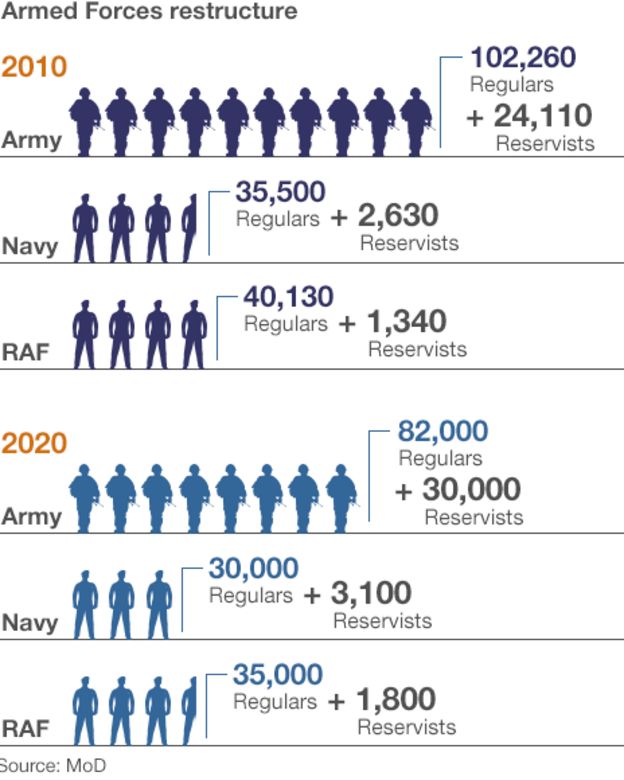In The Guardian’s article ‘UK ministers turn on defence critics’ today, the political smoke and mirrors of Whitehall and the Ministry of Defence are clear.
Restating or re-announcing currently agreed troop deployment and engagement or procurement spending as part of the 2% GDP defence spend is nothing more than a ruse.
Our concerns were voiced by a speaker in a recent Lords debate on defence. “I deplore targets in this because I believe that it is only sensible to base defence spending on what the defence of the realm requires”, said the former general and chief inspector of prisons, Lord Ramsbotham.
He added: “Without having a national security strategy on which an SDSR [strategic defence and security review] can be based you have no idea when you are going into these sums whether you have what is required.”
George Osborne on the Andrew Marr show said "Every public service has to make sure it is spending its money well."
We agree.
The development of Whole Force deployment in delivering our defence needs is based on utilising the right people with the right skills at the right time to deliver strategic, proiritised, value for money outputs. If you remove or diminish the capability and capacity of any of the military or civilian components you will increase the likelihood of deployment failure and delivery costs.
Year on year civil servants within the Ministry of Defence have supported the front line delivering value for money defence outputs and savings.
We would like to be confident that our politicians, senior civil servants and military colleagues in Whitehall and the Ministry of Defence understand this and have ‘battled’ to protect the value and flexibility of delivering our defence needs through the Whole Force model.
Somehow, we doubt it. The political smoke and mirrors of Whitehall politics currently obscures the sacrificial lamb, but sacrificial victims there will be.
Sunday 22 November 2015
Saturday 21 November 2015
To Cut or not to Cut - that is the question?
As we anxiously await the Strategic Defence and Security Review 2015, the details of which will be announced on Monday 23rd November, our thoughts turn to the comments around the need to maintain a credible defence capability that is both effective and efficient.
The BBC News reported in June that:
The US defence secretary says he fears the UK could become "disengaged" if it makes further cuts to defence spending.
Ashton Carter told the BBC Britain had "always punched above its weight" and "it would be a great loss to the world if it now took action that would indicate disengagement".
The UK government said it was committed to meeting Nato's target of spending 2% of GDP on defence this financial year.
But it says future budgets will be determined in the next spending review.
Mr Carter's comments follow similar remarks earlier this year by the head of the US Army, General Raymond Odierno, who warned further cuts could see British units operating within US ranks, rather than divisions working alongside each other.
Julian Lewis, Conservative MP for New Forest East, told BBC Radio 4's The World at One
that 2% spending on defence "is not a target, it's a minimum" and any possibility that level may drop was "frankly staggering".
"The international situation is darkening and what we must avoid at all costs is having to spend the money later when a crisis has arisen, when by spending it now we might help deter people from provoking such crisis," he said.
The cross-party Defence Select Committee also argued recently that the rise of Islamic State and the increase in Russian aggression meant Britain's 2010 defence plans "no longer reflect the new threats to peace around the world".
Over recent years to value of civilian staff supporting and enabling our armed forced has been put forward as the cost effective Whole Force operating model.
Just yesterday in a leaked letter, one of the UK's most senior police officers voiced their concern that the cuts expected to the police forces in next week's Spending Review could "reduce very significantly" the UK's ability to respond to a Paris-style attack.
When the public believe we need resources in defence and security to safe guard them against acts of aggression, it will be interesting to see where politically both the government and senior civil servants have decided where the axe will fall in MOD.
Whatever cuts are announced in MOD they will result in a reduction in our defence capability and flexibility and people losing their jobs.
The BBC News reported in June that:
The US defence secretary says he fears the UK could become "disengaged" if it makes further cuts to defence spending.
Ashton Carter told the BBC Britain had "always punched above its weight" and "it would be a great loss to the world if it now took action that would indicate disengagement".
The UK government said it was committed to meeting Nato's target of spending 2% of GDP on defence this financial year.
But it says future budgets will be determined in the next spending review.
Mr Carter's comments follow similar remarks earlier this year by the head of the US Army, General Raymond Odierno, who warned further cuts could see British units operating within US ranks, rather than divisions working alongside each other.
Julian Lewis, Conservative MP for New Forest East, told BBC Radio 4's The World at One
that 2% spending on defence "is not a target, it's a minimum" and any possibility that level may drop was "frankly staggering".
"The international situation is darkening and what we must avoid at all costs is having to spend the money later when a crisis has arisen, when by spending it now we might help deter people from provoking such crisis," he said.
The cross-party Defence Select Committee also argued recently that the rise of Islamic State and the increase in Russian aggression meant Britain's 2010 defence plans "no longer reflect the new threats to peace around the world".
Over recent years to value of civilian staff supporting and enabling our armed forced has been put forward as the cost effective Whole Force operating model.
Just yesterday in a leaked letter, one of the UK's most senior police officers voiced their concern that the cuts expected to the police forces in next week's Spending Review could "reduce very significantly" the UK's ability to respond to a Paris-style attack.
When the public believe we need resources in defence and security to safe guard them against acts of aggression, it will be interesting to see where politically both the government and senior civil servants have decided where the axe will fall in MOD.
Whatever cuts are announced in MOD they will result in a reduction in our defence capability and flexibility and people losing their jobs.
Subscribe to:
Posts (Atom)

